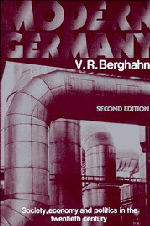Book contents
- Frontmatter
- Contents
- List of maps
- Preface
- Abbreviations
- Glossary
- 1 Wilhelmine Germany, 1900–1914
- 2 War and civil war, 1914–1923
- 3 The Weimar Republic between stabilisation and collapse, 1924–1933
- 4 The Third Reich, 1933–1945
- 5 Occupation and division, 1945–1960
- 6 The two Germanies since the 1960s
- Statistical tables
- Chronological table
- Select bibliography
- Index
3 - The Weimar Republic between stabilisation and collapse, 1924–1933
Published online by Cambridge University Press: 05 June 2012
- Frontmatter
- Contents
- List of maps
- Preface
- Abbreviations
- Glossary
- 1 Wilhelmine Germany, 1900–1914
- 2 War and civil war, 1914–1923
- 3 The Weimar Republic between stabilisation and collapse, 1924–1933
- 4 The Third Reich, 1933–1945
- 5 Occupation and division, 1945–1960
- 6 The two Germanies since the 1960s
- Statistical tables
- Chronological table
- Select bibliography
- Index
Summary
Intellectual and cultural activity
The picture which has been painted so far of German history in the early twentieth century is one of a society racked by social tensions and violent political conflicts. It was a development which cannot be separated from the experience of rapid economic change since the late nineteenth century, followed by total war, defeat and civil war. What exacerbated these tensions and the violence which accompanied them was the inflexible conservatism of the country's agrarian, industrial and educated elites. Time and time again they thwarted even moderate reformist change and frustrated the aspirations of a growing number of working-class Germans. It was a conservatism which stemmed not merely from a perceived threat to established social, political and economic positions from below, but a more general obsession with an alleged undermining of accepted values and social morality resulting from the advent of ‘mass society’. Invariably, the cities were identified as the main source of moral corruption and decay, not only because they were seen as seedbeds of socialism and ‘low culture’, but also because they had become, already before 1914, centres of alternative life-styles, artistic experimentation and radical debate among coffee-house intellectuals.
It is not easy to describe how hostile and philistine were the reactions of the upper classes, and also of many petty bourgeois Stammtisch politicians in the provinces to these tendencies. Literary movements or avantgarde artistic activity provoked almost universal indignation. Long before 1914 Reich Chancellor Hohenlohe gave telling expression to this in his diary after viewing Gerhart Hauptmann's Hannele's Himmelfahrt.
- Type
- Chapter
- Information
- Modern GermanySociety, Economy and Politics in the Twentieth Century, pp. 82 - 128Publisher: Cambridge University PressPrint publication year: 1987



